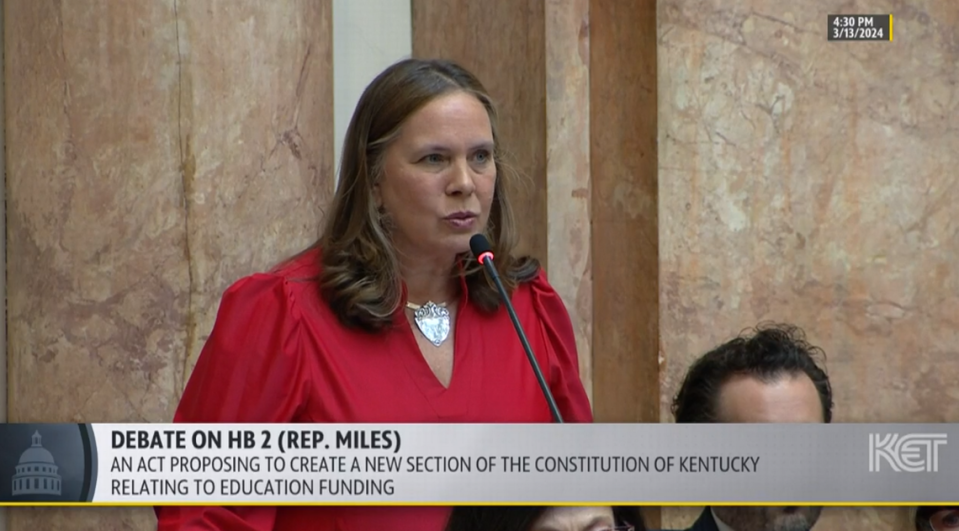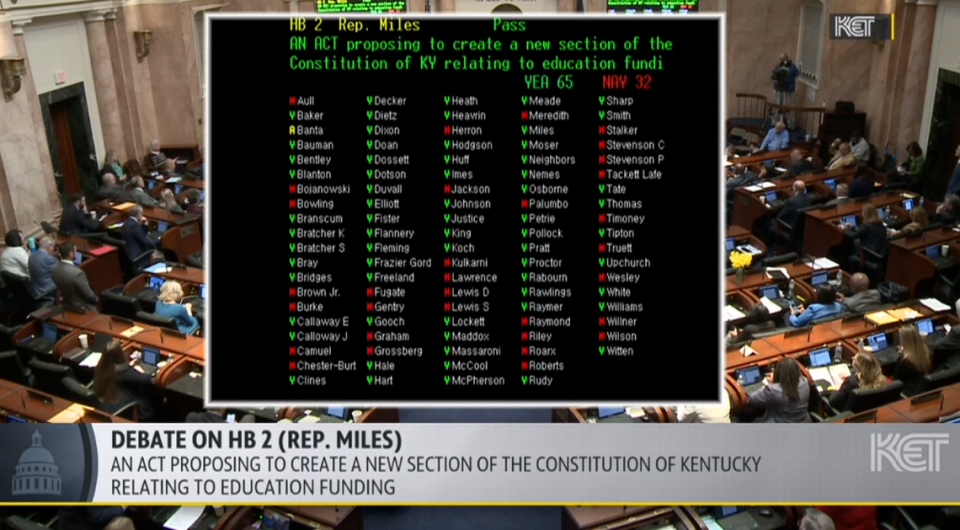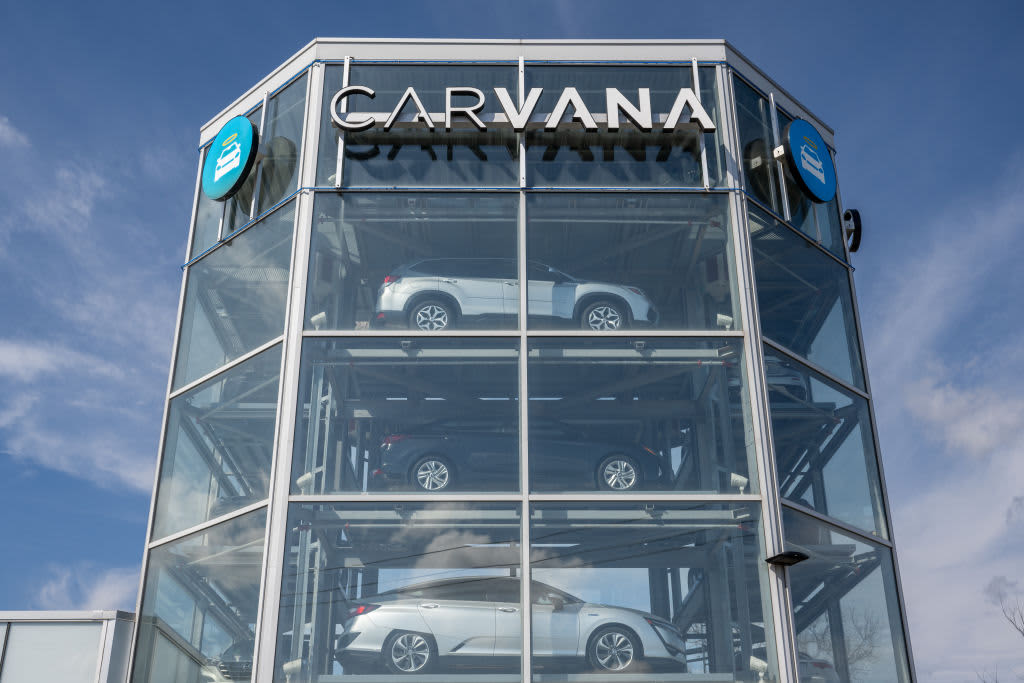A “school choice” amendment bill — a top priority for Republican lawmakers in the 2024 General Assembly — cleared the Kentucky House of Representatives Wednesday afternoon following more than two hours of contentious floor debate.
In a 65-32 vote, legislators passed House Bill 2, which would give voters the choice of amending the state constitution to allow taxpayer dollars to go to non-public schools, such as charter and private schools, sponsored by Majority Caucus Chair Suzanne Miles, R-Owensboro.
All 20 Democrats in the House voted against the bill, as did 12 Republicans, primarily from rural communities.
Democrats accused GOP leadership of stifling the discussion by refusing to allow them to mention the potential education ramifications of the very amendment they were discussing.
Miles and Speaker David Osborne, R-Prospect, repeatedly admonished Democrats who spoke against the bill that their questions and comments — about charter school performance and costs of voucher programs in other states, for example — were not pertinent to the bill at hand.
Sign up for our Bluegrass Politics Newsletter
A must-read newsletter for political junkies across the Bluegrass State with reporting and analysis from the Lexington Herald-Leader. Never miss a story! Sign up for our Bluegrass Politics newsletter to connect with our reporting team and get behind-the-scenes insights, plus previews of the biggest stories.
Rep. Josie Raymond, D-Louisville, asked if it was good policy-making to consider the potential long-term impact of changing the constitution.
“We have seen in this body in recent years many constitutional amendments proposed, and often there is enabling legislation attached because legislators say, ‘Well, I want to know what it might look like if we put this amendment on the ballot and it passes, what might the enabling legislation look like?” Raymond said. “Legislators have asked for that. How come in this case we don’t have any enabling legislation?”
“It’s irrelevant to the conversation today,” Miles responded. “This will solely put a constitutional amendment on the ballot for the voters to decide if they want us to consider, that we may consider, any other future … legislation.”
Raymond predicted that Kentucky voters would overwhelmingly reject Miles’ amendment on a 70-30 vote.
“The voters of Kentucky know the value of our public schools, and the people they employ, and what they bring to our communities,” Raymond said. “They know that this push to use public money on private schools is happening after years of work to defund and delegitimize our public schools.
“They will say no. This one’s another loser. Just like they’ve rejected most of the recent amendments that this Republican supermajority has put on the ballot.
“It will be so embarrassing for you all.”
Few Republican lawmakers spoke in favor of HB 2, despite its 65 votes of support.

House Education Chair Rep. James Tipton, R-Taylorsville, said he hadn’t planned to speak on the bill, but after more than an hour of discussion, he felt it was “appropriate for somebody to get up and actually speak about what’s before this body.”
“Ultimately, the decision we’re asking today, is do we have faith, do we trust the voters of Kentucky to make a decision?” he said. “Are we fearful that they may not agree with us? They may not agree with what our particular position is? My vote today is going to be to put my faith and trust in the voters of the commonwealth of Kentucky to make that decision.
“I may be happy with the outcome. I may not. But I will certainly accept the vote of the people.”
Proposed constitutional amendments, like HB 2, must pass both the House and Senate by a vote of three-fifths of members in order for them to make it the statewide ballot.
The bill now heads to the Senate for consideration.
The bill was approved in an 11-4 vote Tuesday in a House committee. Democrats criticized Republicans for specially calling the committee with little more than two hours’ notice.
‘We have needs in our education system’
Rep. Chris Fugate, R-Chavies, said he personally supported school choice, but could not vote for it because of the ongoing needs in his district, which was hit hard by the devastating 2022 flooding in Eastern Kentucky.
He recalled dozens of people sheltered in his church in the aftermath.
“I watched as our school districts also opened up shelters, and I saw teachers that would come to the church … bring things to the church every day for our kids to do,” he said. “They helped feed our kids, cried with our kids, they loved on our kids, they were there with our kids.”
Almost two years later, he said, there are still schools “that have not been restored and most likely never will be unless the General Assembly appropriates money in the budget to fix those needs.”
Among the ongoing hardships Fugate described: two schools in Perry County were combined an put into an old school building that had closed years earlier; a bus driver setting off at 4:45 a.m. to pick up the first student at 6 a.m. because the nearest school is in Hazard now, not Buckhorn; and of $47 million in FEMA claims for rebuilding those two Perry County schools, more than $40 million has not been approved.
“What I’m saying is, we have needs in our education system in the mountains,” he said. “And it appears (some people) sometimes really don’t give two hoots about Eastern Kentucky.”
Fugate said he’d be for HB 2 — after meeting the needs that exist in the education system currently.
“It’s hard for me to go home with a reserve trust fund of $3.7 (billion) and brag about it when I don’t have my vocational school,” he said. “All I’m doing is pleading the case of my district because my people deserve their schools to be fixed before we fund other schools.
“The bill that’s before us, again, I’m for it. My kids went to Christian school, I paid the tuition. I’m not against this. But what are we supposed to do? Keep driving an hour-and-a-half on the school bus?”


Another Eastern Kentucky Republican, Rep. Jacob Justice of Elkhorn City, said he voted for the bill to give Kentuckians a say in the matter. But if it appears on the ballot, he will “definitely be a hard no.”
“I love the idea of families having multiple options to pick the school that best fits their child,” he said. “Then on the other hand, anything that could be detrimental or hurt our public school systems in any way… I cannot stand for it. Especially in my district.
“We’re already struggling.”
Lt. Gov. Coleman: Amendment will fail
Lt. Gov. Jacqueline Coleman, a public school educator before taking elected office in 2019, predicts Kentucky voters will reject the amendment if given the option — and she plans to do her part to make that happen.
“I plan on, if it makes it to the ballot, doing everything I can, not just to defeat that amendment, but defeat the folks who support it because they are not what’s best for Kentucky’s kids,” Coleman told the Herald-Leader Wednesday before the vote.
“And I’m willing to work with anybody. I don’t care what your party is, as long as you know that you’re in it for the kids.”
Democratic Gov. Andy Beshear, who won reelection in November alongside Coleman, also has promised to fight any school choice effort.
“I’m opposed to any school choice amendment and any voucher program — anything that would take dollars from our public schools and send them to unaccountable private schools,” he told the Herald-Leader in October.
Coleman said HB 2 was yet another example of Republican leadership continuing “the war on public education” instead of “focusing on the real needs of Kentucky families.”
Her stance on charter schools and vouchers is informed by her time in the classroom, Coleman said. But, she added, such states as Arizona, Arkansas and Texas provide evidence for “how much these systems have failed kids.”
The governor of Arizona wants to overhaul the state’s voucher program to “rein in the skyrocketing costs and reduce the number of participants” in the face of a growing state budget deficit, the Associated Press reported in January.
Data from the Arkansas voucher program’s first year of data shows that “less than 5% of students in the program were previously enrolled in a public school,” according to the Arkansas Advocate in October. First-time kindergartners make up about 31% of voucher recipients.
And in Texas, 21 House Republicans, largely from rural districts, voted with Democrats to “strip school vouchers from the chamber’s massive education funding bill,” the Texas Tribune reported in November.
“I just don’t see any reason for us to follow these other states off this cliff,” Coleman said. “It’s been proven time and time again that this is not a solution.”
What’s in the bill?
The ballot question put forth in HB 2 would read as follows:
“To give parents choices in educational opportunities for their children, are you in favor of enabling the General Assembly to provide financial support for the education costs of students in kindergarten through 12th grade who are outside the system of common (public) schools by amending the Constitution of Kentucky as stated below?
“The General Assembly may provide financial support for the education of students outside the system of common schools. The General Assembly may exercise this authority by law, Sections 59, 60, 171, 183, 184, 186, and 189 of this Constitution notwithstanding.”
The original bill said lawmakers would be able to fund non-public schools, like charter or private schools, notwithstanding five provisions of the Kentucky constitution; in the substitute, that grew to seven sections.
If given the OK by the Senate, too, the question will appear on the November ballot. It would then need to be approved by the majority of voters.
In late 2022, the Kentucky Supreme Court unanimously struck down a 2021 bill that would have created a privately funded needs-based assistance program to cover educational expenses for families that would have been offset by tax credits.
Then, in December 2023, Franklin Circuit Court Judge Phillip Shepherd struck down a law that would have set up a funding mechanism for charter schools in the state.
Because charter schools are publicly funded but operated by independent groups, Shepherd said “the plain language of the Kentucky Constitution itself, yields the inescapable conclusion” that they do not meet the definition of public schools.
Reporter Alex Acquisto contributed to this story.

Amanda Smith is a dedicated U.S. correspondent with a passion for uncovering the stories that shape the nation. With a background in political science, she provides in-depth analysis and insightful commentary on domestic affairs, ensuring readers are well-informed about the latest developments across the United States.



:max_bytes(150000):strip_icc():focal(956x275:958x277)/prince-harry-service-members-of-the-year-42624-1a874188a0db4f4ea83e4cca395daf35.jpg)



